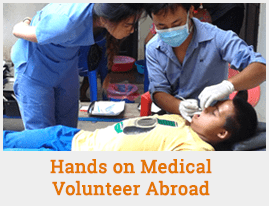VOLUNTEER IN COSTA RICA
' I LOVE this experience in chitwan for though short period! '
Xue Ying Fiona WangSea turtle conservation project
The Most Affordable
Volunteer fees starting at just
$900
The Most Reputed
Since 1998, over 18,000 Volunteers, hundreds of online reviews
The Most Transparent
No Middlemen. Pay your fees directly to host families and projects.
Project Summary
Do you like sea animals, namely the sea turtle? Would you enjoy helping nurse them back to health and making sure they stay healthy in their natural habitat? If so, you should join RCDP's sea turtle conservation project! Sea turtles have made an existence for some 200,000,000 years now. Over these years there have been over 100 species of marine turtles. Today we have seven species worldwide. Sea turtles spend most of their life in the water, making them completely adapted to the sea. The front limbs act as flippers with the back limbs acting like paddles.
The gender of the hatched turtles depends on the temperature of the nest while growing. The perfect temperature of the eggs in a nest should be at 29.5 degrees Celsius (85.1 degrees Fahrenheit). Before the eggs even hatch, they face many dangers. They can fail to hatch due to heavy rain or seawater flooding the nest. High tides can wash away whole nests or the nests can be picked at by different animals who are hunting it for food.
The natural habitat of turtles in Costa Rica is in danger. RCDP needs your help to protect it, as urban sprawl and farming is taking over land that used to be claimed by the turtles. The species are now threatened. Conservation efforts are focusing on strengthening the turtle population. They provide support and protect them, encourage their breeding efforts, conduct research on their health and migration pattern, and record their behavior.
Your activities as a volunteer
The Costa Rica Turtle Conservation volunteer project is situated in rural beach areas, often near impoverished communities. Volunteers play a crucial role in supporting biologists, biology interns, project staff, and local residents dedicated to safeguarding turtle eggs and maintaining nesting grounds.
It's important to note that these projects often involve sustainable egg harvesting programs that contribute to the well-being of local communities by providing food or income. These initiatives aim to prevent over-harvesting and poaching and are closely monitored by the Costa Rican government.
As a volunteer, you'll have the opportunity to:
- Conduct beach patrols during both day and night to locate nesting turtles.
- Tag and/or count turtles for research and conservation purposes.
- Transfer nests into protected hatcheries to ensure their safety.
- Count or collect turtle eggs, contributing to conservation efforts.
- Assist with beach cleanup activities to maintain a healthy environment.
- Participate in community outreach programs to engage and educate locals.
- Contribute to project upkeep and maintenance to ensure its sustainability.
Your involvement in these activities directly contributes to the protection and preservation of turtle populations, fosters community development, and supports the overall success of the conservation project.
Project skills required
While not mandatory, having a basic grasp of the Spanish language is recommended. A "go-getter" attitude ensures you can be as involved as you desire. We highly encourage a proactive volunteering approach – be outgoing and ready to assist wherever and whenever needed. Consistently attending and respecting the schedule is crucial for maximizing your impact on both you and the project.
For beach patrols, it's important to note:
Physical Fitness: Given the nature of beach patrols involving extensive walking in the sand, being physically fit and prepared is essential.
This combination of language understanding, a proactive mindset, and physical fitness will contribute to a more enriching and impactful experience as a volunteer in the Costa Rica Turtle Conservation project.
Project location
Turtle Conservation project is located on both the Caribbean (Limón area) and Pacific (Nicoya peninsula) coasts.
Project essentials
Backpacks are highly recommended for this project, as big suitcases do not come in handy. We also recommend bringing cash, your ID card, a valid passport, health insurance, your driver's license, and credit cards. These are all important documents that could be useful for you at various points of your trip. As far as packing, we suggest you pack for hot weather and dirty conditions. This includes lightweight clothes that can dry fast as you will be getting dirty and wet. Don't forget a water bottle to stay hydrated and some sunscreen, as you will be outside a lot throughout the day!
The Fee and Dates
RCDP Costa Rica Volunteer Programs start every Monday throughout the year.
Volunteer Program In Costa Rica
Every year hundreds of volunteers working with UK and USA based organizations end up paying up to $2500 to volunteer in Costa Rica for 2 weeks. Unfortunately, only a small portion of that money actually goes to host the local projects and host families. The local host projects, childcare centers, schools, and local NGO’s in Costa Rica are poor and need external support to run their programs. In our program, you will pay your fee directly to host families and projects upon arrival in Costa Rica. When you join our program, we will make sure that all of your money goes to the projects and host families. Part of your fees also helps us to cover our expenses. The program fee is divided into a registration fee ($279) and weekly fee for room, food, coordination, and project donation.
Click to find the allocation of $279
In Costa Rica, the weekly program fee is divided between coordination (services of local staffs), host family (room/2-3 local foods a day depending on the project), and project donation. Costa Rica is an expensive tourist destination; therefore, nearly 90% of your weekly fee goes to covering your food, room, and coordination. While 10% of your fee goes to the project as a material donation (not cash). Below is the breakdown of cost in on a weekly basis.
Program Fee (US$)
| Duration | Turtle Conservation |
|---|---|
| 1 Week | N/A |
| 2 Weeks | $900 |
| 3 Weeks | $1,265 |
| 4 Weeks | $1,600 |
| 5 Weeks | $1,870 |
| 6 Weeks | $2,140 |
| 7 Weeks | $2,410 |
| 8 Weeks | $2,680 |
| 9 Weeks | $2,950 |
| 10 Weeks | $3,220 |
| 11 Weeks | $3,490 |
| 12 Weeks | $3,760 |
- Comprehensive Travel Insurance $3.49/day ( below 28 years) and $4.49/day ( above 28 years) »
- Spanish Language Classes
- Manuel Antonio, Costa Rica - $150/week
- San Jose, Costa Rica - $125/week
Program fees cover:
- Shared Accommodation with host family from Sunday to Saturday
- 2 meals per day (Breakfast & Dinner)
- Airport Pick up
- In-country support
- Program Orientation, Walking Tour, Safety Presentation
- Project Management
- Volunteer Certificate
- Discount for returning volunteers
- Letter of Recommendation (upon request)
- Emergency contact 24/7
- Access to computer lab, high-speed office-wide wifi at the institute, and access to weekly salsa dance classes and cooking classes
- Free coffee and tea at the on-site snack bar
Program fees dont cover:
- Visas
- Airfare
- Personal expenses such as soft drinks and snacks
- Daily transportation
- Airport return transfer
- Extra nights of housing (can be booked at an additional cost)
 1-2543048951
1-2543048951



